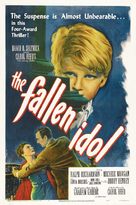Reviews provided by RottenTomatoes
Jeff Shannon, Seattle Times: Crafting plot through dynamic use of London locations and a magnificent embassy set designed by Vincent Korda, Reed and venerable cinematographer Georges Perinal set a fascinating, multilayered stage for Phil's dilemma. Read more
Michael Wilmington, Chicago Tribune: As a portrait of the sometime destructiveness of innocence and as a sharp fresco of post-war Britain, this movie is a little masterpiece, an idol that has never fallen. Read more
Eleanor Ringel Gillespie, Atlanta Journal-Constitution: An indelible portrait of childhood's confusions, disillusionments and inevitable lost innocence. Read more
Ty Burr, Boston Globe: A Hitchcockian thriller with human conundrums to go with the suspense. Read more
Kenneth Turan, Los Angeles Times: A classically well-made film that is both unexpected and exceptionally gripping. Read more
Lisa Kennedy, Denver Post: Remains one of those classics that makes you thankful you haven't seen them all. Read more
Chris Vognar, Dallas Morning News: It's a masterful and unsentimental child's-eye view of the cold, hard adult world. Read more
Manohla Dargis, New York Times: Graham Greene liked to say that he preferred The Fallen Idol (1948) to the more famous The Third Man (1949) because it was more a writer's film than a director's. Read more
Variety: A fine sensitive story, a brilliant child star and a polished cast, headed by Ralph Richardson and Michele Morgan, combine to make The Fallen Idol a satisfying piece of intelligent entertainment. Read more
J. Hoberman, Village Voice: The Fallen Idol is actually a superior psychological drama [to Reed's The Third Man.. Read more
Ann Hornaday, Washington Post: This is an example of a writer and director working in perfect harness, with Reed smoothly ratcheting up the story's suspense and Greene speculating on his cardinal theme of moral ambiguity. Read more

